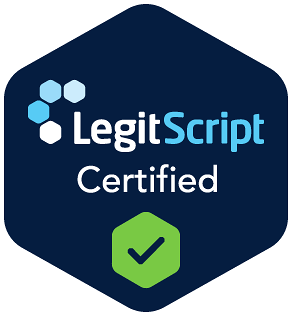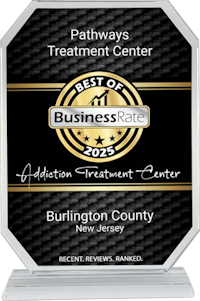Compassionate Dual Diagnosis Treatment in New Jersey
Dual Diagnostic Treatment
In New Jersey, the picture is equally eye-opening: Among adults treated within the state’s mental health system in 2020, 22% also had a SUD diagnosis. That equated to 24,931 individuals navigating both mental health and substance use challenges, and yet, only 12,740 of them received treatment for both. These numbers highlight a significant gap in care and underscore how vital integrated, accessible treatment options truly are.
At Pathways Treatment Center in Burlington, NJ, we understand that treating one without the other can leave the recovery journey incomplete. That’s why our dual diagnosis program is built on a foundation of compassion, integration, and personalization. Each client receives a tailored plan that holistically addresses both mental health and substance use needs, from evidence-based therapies and medication-assisted treatment to individual, group, and family sessions.
Dual Diagnosis Treatment
What is Dual Diagnosis Treatment?
Dual diagnosis is when you have a substance use disorder at the same time as another mental health disorder. Dual diagnosis treatment is a specialized treatment plan that includes therapies, medications, and activities to address co-occurring disorders.
It’s not uncommon for a mental illness to co-exist with substance abuse. Conditions such as depression, anxiety, ADHD, post-traumatic stress disorder, and bipolar disorder can even lead to substance abuse. The goal of dual diagnosis treatment is to help patients achieve long-term recovery from both substance use disorder and the symptoms of mental illness.

Dual Diagnosis Treatment
What Mental Health Concerns Commonly Co-Occur with Substance Use?
When someone struggles with addiction, it’s often more than just a substance use disorder. Many people also face underlying mental health conditions that either contribute to or are worsened by their drug or alcohol use. These overlapping challenges make recovery more complex, but also highlight why dual diagnosis treatment is so important.
At Pathways Treatment Center in Burlington, NJ, we frequently work with clients who experience both substance use disorders and one or more of the following mental health conditions:
Anxiety disorders are among the most common mental disorders that co-occur with addiction. Symptoms such as constant worry, panic attacks, or social anxiety can drive individuals to misuse alcohol or drugs in an attempt to feel calmer. Unfortunately, substance use often makes anxiety worse over time. Through therapies like Cognitive Behavioral Therapy (CBT) and mindfulness-based strategies, Pathways helps clients learn healthier ways to manage anxiety while addressing substance use.
Bipolar disorder involves extreme mood swings ranging from depressive lows to manic highs. During manic phases, individuals may act impulsively, increasing the risk of substance misuse. During depressive episodes, alcohol or drugs may be used to self-medicate overwhelming sadness or hopelessness. Our integrated approach stabilizes mood while addressing addiction, providing balance and structure for long-term recovery.
Depression is a leading co-occurring disorder in people with addiction. Feelings of hopelessness, loss of interest in daily life, and fatigue can push individuals toward drugs or alcohol as a temporary escape. However, substance use often deepens depressive symptoms and fuels the cycle of relapse. At Pathways, evidence-based therapies and medication management work hand in hand to treat both depression and addiction at the same time.
PTSD often develops after experiencing trauma, such as abuse, violence, or military combat. Flashbacks, nightmares, and hypervigilance can make daily life feel unbearable, leading many people to use substances to numb emotional pain. Unfortunately, this coping mechanism prevents real healing. Pathways’ trauma-informed care approach helps clients process their experiences safely, reduce symptoms, and find healthier coping strategies.
Individuals with ADHD may struggle with impulsivity, focus, and restlessness, which can increase the risk of substance use as a way to self-regulate. Stimulants, alcohol, or cannabis are often misused in attempts to calm the mind or boost performance. Our clinicians work to manage ADHD symptoms while providing skills-based therapies that reduce the need for unhealthy coping strategies.
Personality disorders, such as borderline, narcissistic, or antisocial personality disorder, are also common in those with substance use disorders. These conditions can impact relationships, self-image, and emotional regulation, often making recovery more challenging. At Pathways, therapies like Dialectical Behavior Therapy (DBT) emphasize mindfulness, distress tolerance, and interpersonal effectiveness, helping clients navigate both addiction and personality-related struggles.
The overlap between addiction and mental health is complex, but integrated treatment makes recovery possible. At our dual diagnosis treatment center, we address both conditions with compassion, structure, and evidence-based care, helping clients build the tools they need for stability, healing, and lifelong recovery.
Dual Diagnosis Treatment
What are the Common Risk Factors for Dual Diagnosis?
Dual diagnosis occurs due to a variety of factors. However, there are some common risk factors that increase the likelihood of dual diagnosis. Genetics plays a role, and if you have a family history of either substance abuse or mental health conditions, you may be more likely to develop co-occurring disorders, such as anxiety, depression, or obsessive-compulsive disorder. Environmental factors are also high-risk. If you live in poverty, experience chronic stress, or are exposed to violence, this may increase the risk of developing these two disorders.
Similar to environmental factors, trauma contributes to co-occurring disorders. This may be physical or sexual abuse, experiencing a natural disaster, or surviving a tragedy such as a school shooting. It’s also been noted that individuals who use drugs or alcohol at a young age are more at risk of developing a mental health disorder.
While not everyone who has one or more of these risk factors will develop a dual diagnosis, it’s useful to be aware of some causes that lead to co-occurring disorders.
Dual Diagnosis Treatment
Symptoms of Mental Health Disorders
Symptoms of mental health disorders vary by person and condition, but there are common signs that you may notice in yourself or others.
Symptoms may include:
Mood changes
![]()
Chronic fatigue
![]()
Changes in behavior
![]()
Having irrational thoughts
![]()
Disrupted sleeping patterns
![]()
Experiencing delusions or hallucinations
![]()
Difficulty concentrating
![]()
Using drugs or alcohol
![]()
Substance abuse causes serious mental and physical health problems, so it’s important to seek help as quickly as possible when you notice these signs. If you suspect a friend or family member may benefit from substance abuse treatment, you can intervene by offering to get help.
Symptoms of Substance Use Disorder
Recognizing a substance abuse problem early can benefit you during recovery and lessen the severity of withdrawal symptoms.
Common symptoms of substance use include:
- Urges to drink or use drugs
- Difficulty controlling the amount or frequency of substance use
- Neglecting responsibilities
- Engaging in risky behavior
- Lying about or hiding substance use
- Physical pain when you stop using a drug or alcohol
Substance abuse causes serious mental and physical health problems, so it’s important to seek help as quickly as possible when you notice these signs. If you suspect a friend or family member may benefit from substance abuse treatment, you can intervene by offering to get help.
Dual Diagnostic Treatment
What To Expect from Dual Diagnosis Treatment in NJ
Dual diagnosis treatment recognizes that substance use disorder and mental health disorders are connected and require comprehensive treatment. From dual diagnosis treatment, you can expect a thorough assessment to evaluate your addiction and mental health issues. At Pathways, we will then create a treatment plan tailored to your needs.
Effective treatment typically includes a combination of therapies and medication.
Cognitive Behavioral Therapy
Cognitive Behavioral Therapy (CBT) is talk therapy that helps you understand your thought and behavior patterns. This is a useful way to treat co-occurring disorders because it helps you and a therapist identify the root causes of your mental health and substance use problems and resolve the issues. CBT provides you with techniques and tools to manage the symptoms of mental health disorders.
This type of therapy is also useful for relapse prevention. Treating your mental health reduces the risk of abusing substances again.
Dialectical Behavior Therapy
Dialectical Behavior Therapy (DBT) is a type of Cognitive Behavioral Therapy that emphasizes mindfulness. DBT helps you become more self-aware and teaches you to manage your emotions, stress, and close relationships.
DBT includes both individual and group therapy sessions. During these sessions, you may identify negative behaviors or thoughts that may lead to substance use and develop coping mechanisms to refuse your cravings.
Motivational Interviewing
Motivational Interviewing (MI) is psychotherapy that focuses on an individual’s resistance to change. This is successful in addiction treatment because MI helps you find intrinsic motivation to recover.
This type of therapy relies on the belief that people are more likely to change their behavior when they feel that making a change aligns with their values and goals.
Medication Management
Medication management helps you manage symptoms of either withdrawal or a co-occurring disorder. In a dual diagnosis program, you may be prescribed an antidepressant, mood stabilizer, anti-anxiety medication, or medication to manage your substance cravings. These medications reduce symptoms and the risk of relapse.
Medication management is typically offered in addition to other therapy and treatments. Medication-assisted treatment (MAT) can help treat mental health disorders and help the person cope with withdrawal symptoms while completing their recovery program.
Support Groups
Joining a support group may be a part of your dual diagnosis treatment. There are support groups in New Jersey for those who struggle with either their mental health or substance abuse. It’s beneficial to attend meetings with these groups so you can maintain your sobriety.
Support groups provide understanding and encouragement. It’s also important to have a support system while in recovery. Spending time with other individuals who are just as committed to living sober can hold you accountable too.
Dual Diagnosis Treatment At Pathways Treatment Center
At Pathways Treatment Center, we can offer you treatment and help you achieve healing from mental health and substance use disorders. Our dual diagnosis treatment in Burlington, New Jersey, provides flexible options so that you can receive treatment perfectly suited for you. We will answer any of your questions about co-occurring disorders and treatment in our dual diagnosis program.
If you or a loved one has mental health disorders that co-occur with substance use disorder, contact us today to learn how we can help.



